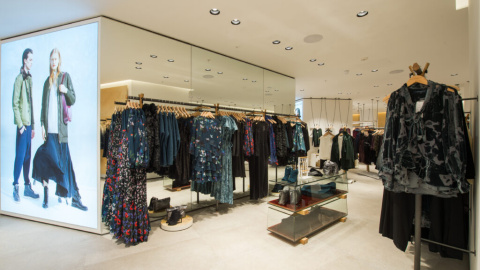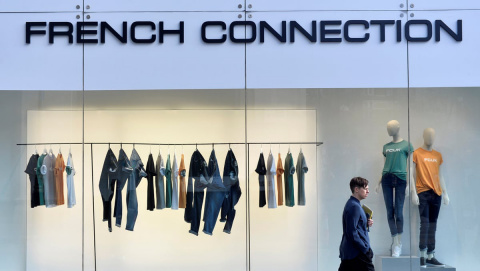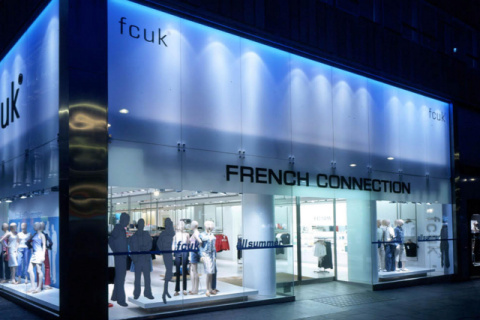“Френч Коннекшн” является одной из самых успешных компаний, производящих парфюмерию, аксессуары и модную одежду.
Начинался путь к славе этого бренда с небольшого магазина, который в 1969 году предлагал покупательницам готовое модное платье. Стивен Маркс, основатель фирмы, принял решение развернуть масштабное производство одежды.
Маркс своевременно догадался о необходимости сменить круг потребителей, поскольку до расширения клиентами магазина было ограниченное число людей. Основной идеей мастера было приближение продукции к среднему классу. Как истинный англичанин, Стивен понимал потребности небогатых сограждан в качественной и стильной одежде.
В начале 70-х годов родился бренд French Connection. Уже через четыре года компания выпустила первые мужские модели. Удобная повседневная одежда для мужчин, отличающаяся высоким качеством, стала отличительной чертой нового модного дома.
Через некоторое время предприниматель ввел в ассортимент товаров детские комфортабельные модели, а также наряды для обоих полов, пригодные для любого случая жизни. Товары для маленьких модников была создана путем упрощения дизайна взрослых моделей. Даже материалы и фасоны были сохранены для детской коллекции. Возрастная группа детского ассортимента охватывала клиентов от школьного возраста до подросткового. Однако, львиная часть прибыли по-прежнему получалась от реализации мужских товаров.
Восточный район Лондона столицы был постоянным местом базирования дизайнерской студии Маркса. Именно в эту обитель моды в 1978 году впорхнула прекрасная Николь Фари, дизайнер с огромным творческим потенциалом. Дама обучалась мастерству дизайнера в самом сердце Парижа, а поработать успела в лучших модных домах Италии и Франции. Профессионализм и инициативность позволили специалисту с талантом возглавить дизайнерскую группу. И вот на посту ведущего специалиста Николь взяла под контроль все линии производства.
80-е годы прошлого столетия подвели компанию Маркса на грань разорения, грозившего англичанину унизительным банкротством. 10 лет потребовалось для вывода фирмы из кризиса. Как только бренд вернулся в строй, он стремительно вырвался на все модные подиумы страны. Справиться с проблемами помогли меры по реконструкции бренда, подкрепленные довольно агрессивными рекламными проектами.
В английском языке есть всем известное плохое слово “fuck”. Справедливости ради стоит отметить, что рекламный отдел Френч Коннекшн не имел в виду ничего плохого, переименовывая лейбл в 1997 году. Аббревиатура сложилась из названия French Connection United Kingdom.
Использование дерзкого названия требовало и агрессивной концепции, которая не разочаровала потребителей. Теперь компания во всеуслышание отреклась от моды. В поддержку слогана улицы Лондона заполнились рекламными стендами с оригинальным изображением. Плакаты представляли собой удлиненный белый прямоугольник – фото девушки или юноши, которое было обрезано по диагонали.
Появление провокационной рекламы просто не могло остаться незамеченным Комитетом по контролю английской рекламы. На стол главы Комитета ежедневно ложились гневные письма от возмущенных горожан. Решение цензоров было однозначным: ознакомление с любым рекламным проектом фирмы до того, как произойдет ее размещение на улицах города.
Однако меры оказались неэффективными. Уже следующая реклама от эпатажной компании звучала fcuk advertising, что в переводе звучит как “пошла реклама на…”. Правда, в угоду проверяющей организации фирма сделала на плакатах приписку, говорящую о том, что fcuk – просто аббревиатура. Но скандал грянул с новой силой, к слову сказать, на радость руководству модного дома. Все дело в росте прибыли, взлетевшей до небес, благодаря спорам вокруг скандала.
Хулиганская реклама помогла фирме войти в 2001 году в число самых продаваемых компаний во всем мире. Великобритания покрылась сетью эксклюзивных магазинов с почти ругательным брендом. Работа рекламного отдела набирала обороты, разрабатывались все более дерзкие варианты вывесок и слоганов.
Американцы еще до скандального переименования лейбла полюбили английскую одежду. Но агрессивная рекламная компания подстегнула интерес в США, вызвав, наоборот, недовольство на родине марки.
Со временем успех продаж позволил английскому концерну приобретать лицензии на изготовление классической обуви и аксессуаров, а также контрацептивов и алкоголя. Отречение от моды продолжалось и в 2003 году, когда одежда словно говорила: мода не так важна, как кажется.
Дерзкий слоган перестал быть плоским лейблом, он теперь ассоциировался с философией, призывающий отказаться от модных рамок. И вот к 2006 году мировая общественность услышала новый английский призыв: “Мода отрицает стиль”.
Противостояние между традициями моды и требованиями стиля было иллюстрировано при помощи скандального видео, снятого не менее дерзким Дунканом Джонсом. Сын Дэвида Боуи разработал сценарий, по которому две девушки, олицетворение моды и стиля соответственно, устраивают жестокий бой. Битва завершается страстным поцелуем, означающим невозможность победы одного над другим.
Даже позднее время трансляции не помогло избежать громкого скандала. Фирма была призвана к ответу в суде за плагиат. Ожидания маркетологов на новый взрыв популярности продукции не оправдались. Руководство концерна вместо прибыли, понесло ощутимые убытки. Было принято решение отойти от заезженной темы, чтобы переключиться на спокойное и классическое производство. Больше ругательство не влияло на его политику.
© Times of U



French Connection is one of the most successful perfume, accessories and fashion companies in the world.
The path to fame of this brand began with a small store, which in 1969 offered customers a ready-made fashionable dress. Stephen Marks, the founder of the company, decided to launch a large-scale production of clothing.
Marks quickly guessed about the need to change the circle of consumers, since before the expansion of the store’s customers there were a limited number of people. The main idea of the master was to bring the products closer to the middle class. As a true Englishman, Stephen understood the needs of poor fellow citizens for high-quality and stylish clothing.
In the early 70s, the French Connection brand was born. Four years later, the company released the first male models. Comfortable, high quality casual wear for men has become the hallmark of the new fashion house.
After a while, the entrepreneur introduced comfortable models for children into the assortment of goods, as well as outfits for both sexes, suitable for any occasion. Products for little fashionistas were created by simplifying the design of adult models. Even the materials and styles were retained for the children’s collection. The age group of the children’s assortment covered clients from school age to adolescents. However, the lion’s share of the profits still came from the sale of men’s goods.
The East London region of the capital was the permanent home of Marks’ design studio. It was into this abode of fashion that the beautiful Nicole Fari, a designer with tremendous creativity, flew in 1978. The lady studied the skills of a designer in the very heart of Paris, and managed to work in the best fashion houses in Italy and France. Professionalism and initiative allowed a talented specialist to lead the design group. And now, as a leading specialist, Nicole took control of all production lines.
The 80s of the last century brought Marx’s company to the brink of ruin, which threatened with humiliating bankruptcy. It took the son of Great Britain 10 years to bring the company out of the crisis. As soon as the brand was back in operation, it quickly broke into all the fashion catwalks of the country. Brand redevelopment measures, backed up by rather aggressive advertising projects, helped to cope with the problems.
In English, there is a well-known bad word “fuck”. It’s fair to say that French Connection’s advertising department didn’t mean anything wrong when they renamed the label in 1997. The acronym originated from the name French Connection United Kingdom.
The use of a bold name also required an aggressive concept that did not disappoint consumers. Now the company has publicly renounced fashion. In support of the slogan, the streets of London were filled with advertising stands with the original image. The posters were an elongated white rectangle – a photo of a girl or boy, which was cropped diagonally.
The emergence of provocative advertisements simply could not go unnoticed by the British Advertising Control Committee. On the table of the head of the Committee, angry letters from the outraged townspeople fell on the table every day. The decision of the censors was unambiguous: familiarization with any advertising project of the company before it is placed on the streets of the city.
However, the measures proved to be ineffective. Already the next advertisement from the shocking company sounded fcuk advertising, which in translation sounds like “advertising went to …”. True, for the sake of the auditing organization, the company made a postscript on the posters saying that fcuk is just an abbreviation. But the scandal erupted with renewed vigor, by the way, to the delight of the leadership of the fashion house. It’s all about the growth of profits, which skyrocketed thanks to the controversy surrounding the scandal.
Hooligan advertising helped the firm to become one of the world’s best-selling companies in 2001. Great Britain is covered with a network of exclusive stores with an almost abusive brand. The work of the advertising department was gaining momentum, more and more daring versions of signs and slogans were developed.
Even before the scandalous renaming of the label, Americans fell in love with English clothing. But an aggressive advertising campaign spurred interest in the United States, causing, on the contrary, discontent in the homeland of the brand.
Over time, the sales success allowed the British concern to acquire licenses for the manufacture of classic shoes and accessories, as well as contraceptives and alcohol. The renunciation of fashion continued in 2003, when clothes seemed to say: fashion is not as important as it seems.
The daring slogan ceased to be a flat label, it was now associated with philosophy, calling for the abandonment of fashionable frames. And by 2006, the world community heard a new English call: “Fashion denies style”.
The confrontation between fashion traditions and style requirements was illustrated with a scandalous video filmed by the equally daring Duncan Jones. David Bowie’s son has developed a scenario in which two girls, the personification of fashion and style, respectively, arrange a fierce battle. The battle ends with a passionate kiss, meaning the impossibility of winning one over the other.
Even the late broadcast time did not help to avoid a loud scandal. The company was sued for plagiarism. Marketers’ expectations for a new explosion in product popularity did not materialize. The management of the concern, instead of profit, incurred tangible losses. The decision was made to move away from the hackneyed theme in order to switch to a calm and classic production. The curse did not affect his politics anymore.
© Times of U

